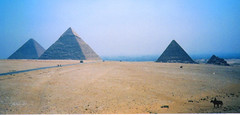 Like most people, my first thought of Egypt is of the Pyramids. Despite the protests and escalating chaos in the country this week, my thoughts still turn to those massive monuments, even though I've never been there or seen them. Here's why.
Like most people, my first thought of Egypt is of the Pyramids. Despite the protests and escalating chaos in the country this week, my thoughts still turn to those massive monuments, even though I've never been there or seen them. Here's why.
Today, we're used to a new record for world's tallest building being set every few years. Recently, for example, the Burj Khalifa in Dubai surpassed both the CN Tower in Canada and the KVLY-TV mast in the U.S.A. as the tallest structure people have ever built. It's no surprise that when Khufu's Great Pyramid of Giza was finished around 2650 B.C., it was the tallest building of its time, at over 140 m (it has since shrunk a little from erosion). The thing is, it remained the world's tallest structure for more than 3800 years.
There it stood, taller and more massive than anything else people ever made, through the rise of the Xia Dynasty in China, the flourishing of Indus Valley peoples in present-day India and Pakistan, and the time of the Sumerians and Hammurabi closer by. In the time of King David, it was already 1500 years old. The Pueblo, Mississippian, and Maya cultures in the Americas, the ancient Greeks, the Roman Empire, the construction and decay of the Great Wall of China, the rise of Christianity and Islam, the Gupta Empire in India, China's political consolidation and naval expansion and then retreat, the reign of the Mongols, the spread of Polynesian culture in the Pacific—all came and went under the record-holding peak of the Great Pyramid.
In the early 1300s, the spire of Lincoln Cathedral in England apparently surpassed the height of the Great Pyramid, but the spire collapsed in a storm 250 years later and was never rebuilt. By then, there were other tall churches, which were eventually overtaken by the Washington Monument, the Eiffel Tower, the Chrysler Building, the Empire State Building, various TV transmitter masts, and now the tower in Dubai.
These things are all ephemeral. Even the Great Pyramid itself will—like its patron Khufu, like Julius Caesar, like Muhammad, like Genghis Khan, like Montezuma and Cortez, like Anwar Sadat and Hosni Mubarak—crumble to dust, eventually. Beneath the Pyramid's brow, Cairo has grown over thousands of years from a riverside oasis to a city of 20 million people, in a country of 80 million. In all that time, it has never even once witnessed a remotely democratic government.
Perhaps the time is coming. Many, like me, hope so. Whatever takes place, the Great Pyramid will still loom overhead, as it has always done.
